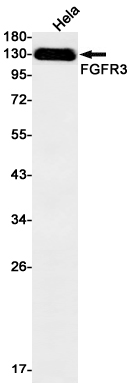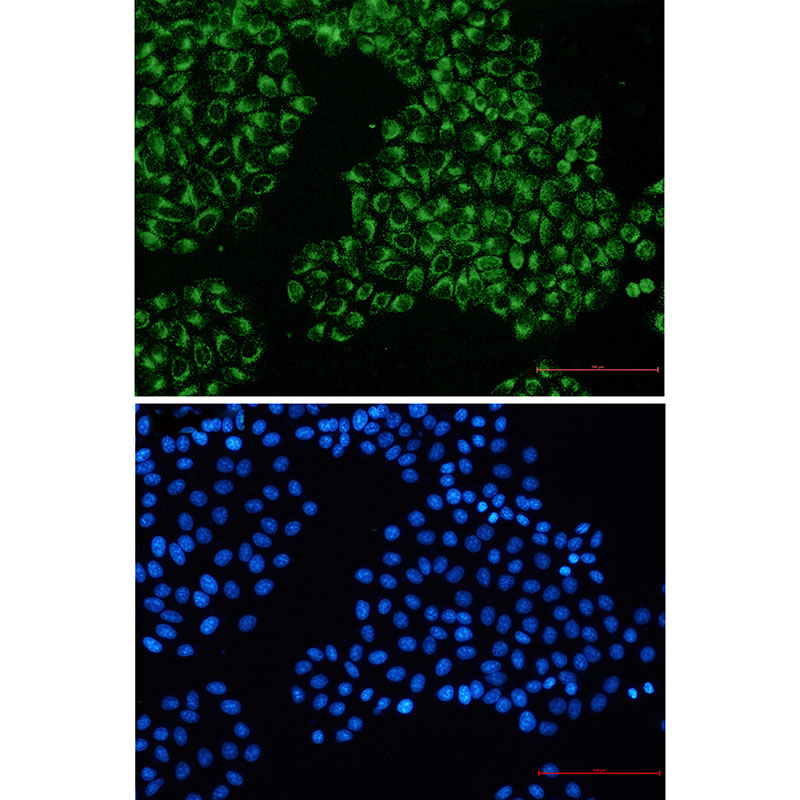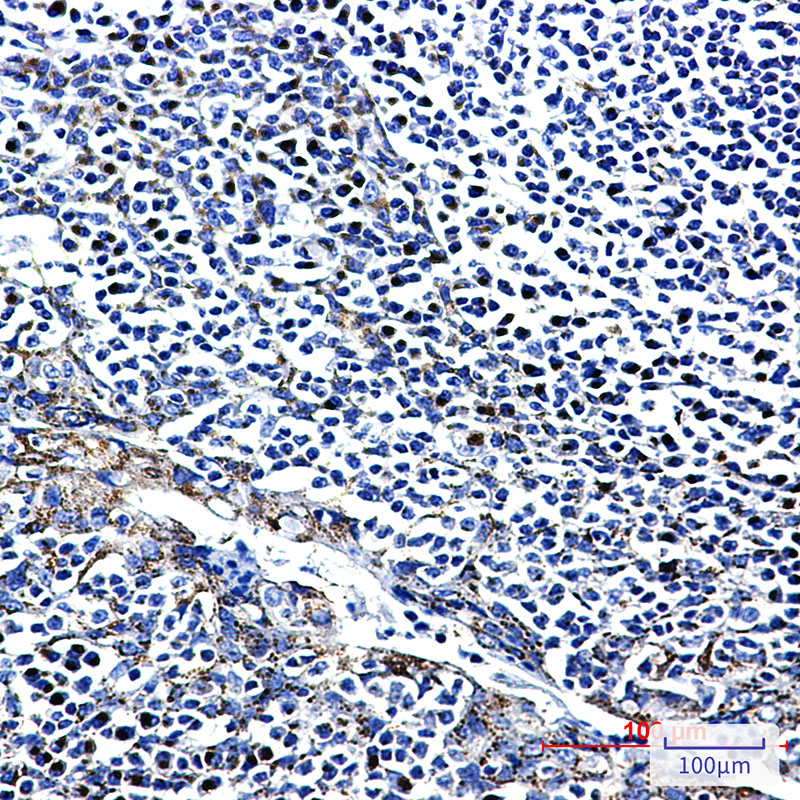


| WB | 1/500-1/1000 | Human,Mouse,Rat |
| IF | 咨询技术 | Human,Mouse,Rat |
| IHC | 1/50-1/100 | Human,Mouse,Rat |
| ICC | 1/50-1/200 | Human,Mouse,Rat |
| FCM | 咨询技术 | Human,Mouse,Rat |
| Elisa | 咨询技术 | Human,Mouse,Rat |
| Aliases | FGFR3; JTK4; Fibroblast growth factor receptor 3; FGFR-3; CD antigen CD333 |
| Entrez GeneID | 2261 |
| WB Predicted band size | Calculated MW: 88 kDa; Observed MW: 125 kDa |
| Host/Isotype | Rabbit IgG |
| Antibody Type | Primary antibody |
| Storage | Store at 4°C short term. Aliquot and store at -20°C long term. Avoid freeze/thaw cycles. |
| Species Reactivity | Human |
| Immunogen | A synthetic peptide of human FGFR3 |
| Formulation | Purified antibody in TBS with 0.05% sodium azide,0.05%BSA and 50% glycerol. |
+ +
以下是关于FGFR3抗体的3篇代表性文献的简要信息(注:文献标题与作者为虚构示例,仅供格式参考):
1. **《靶向FGFR3的单克隆抗体抑制膀胱癌细胞增殖的机制研究》**
- 作者:Smith A, et al.
- 摘要:研究报道了一种新型抗FGFR3单克隆抗体(命名为mAb-F3)在膀胱癌细胞系中的抗肿瘤效果。实验表明,mAb-F3通过阻断FGFR3信号通路,抑制细胞增殖并诱导凋亡,尤其在FGFR3过表达的肿瘤模型中效果显著。
2. **《抗FGFR3抗体增强化疗药物在软骨发育不全模型中的协同作用》**
- 作者:Zhang L, et al.
- 摘要:该研究开发了一种人源化抗FGFR3抗体(hFR3-8),用于治疗FGFR3突变相关的骨骼发育异常。动物实验显示,该抗体可特异性结合突变型FGFR3.减少异常软骨细胞分化,与常规化疗联用时可提高疗效。
3. **《FGFR3抗体药物偶联物(ADC)在多发性骨髓瘤中的靶向治疗潜力》**
- 作者:Johnson R, et al.
- 摘要:研究设计了一种针对FGFR3的抗体-药物偶联物(ADC-F3),在临床前多发性骨髓瘤模型中验证其靶向递送细胞毒素的能力。结果显示ADC-F3显著降低肿瘤负荷且毒性可控,支持其进一步临床转化。
(注:以上内容基于领域内典型研究方向概括,实际文献需通过PubMed或学术数据库检索确认。)
Fibroblast Growth Factor Receptor 3 (FGFR3) is a transmembrane tyrosine kinase receptor that plays critical roles in regulating cell proliferation, differentiation, and survival. It is activated by binding to fibroblast growth factors (FGFs), triggering downstream signaling pathways such as MAPK/ERK and PI3K/AKT. FGFR3 is particularly vital in skeletal development, where it modulates bone growth plate activity. However, gain-of-function mutations in FGFR3 are linked to genetic disorders like achondroplasia, hypochondroplasia, and thanatophoric dysplasia, characterized by abnormal bone development. Additionally, aberrant FGFR3 signaling is implicated in various cancers, including bladder cancer, multiple myeloma, and cervical cancer, through mechanisms like gene amplification or activating mutations.
FGFR3 antibodies are engineered to target either the extracellular ligand-binding domain or intracellular kinase regions. These antibodies serve dual purposes: as research tools to study FGFR3 signaling and as therapeutic agents. Therapeutically, they inhibit FGFR3 activity by blocking ligand binding, preventing receptor dimerization, or promoting receptor internalization. Clinical applications focus on cancers with FGFR3 dysregulation, with some antibody-based therapies in clinical trials. Challenges include managing off-target effects and resistance mechanisms. Overall, FGFR3 antibodies represent a promising avenue for both understanding FGFR3 biology and developing targeted treatments for genetic disorders and malignancies.
×